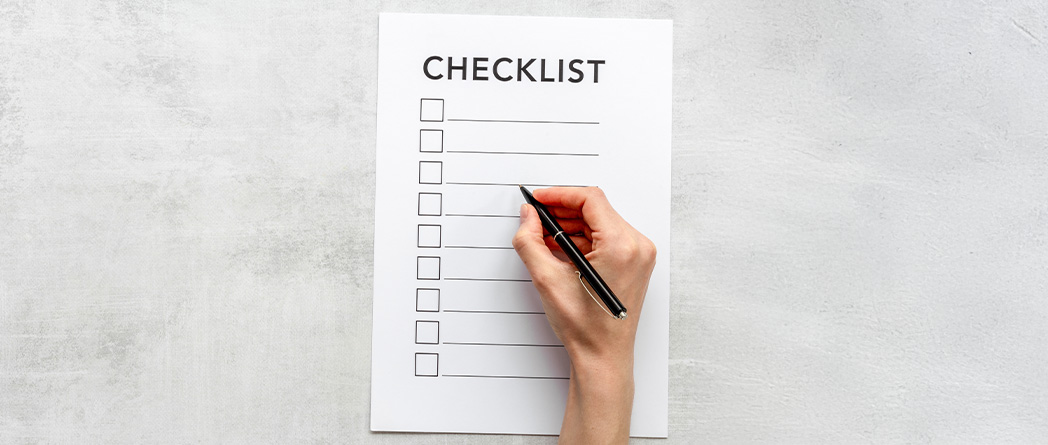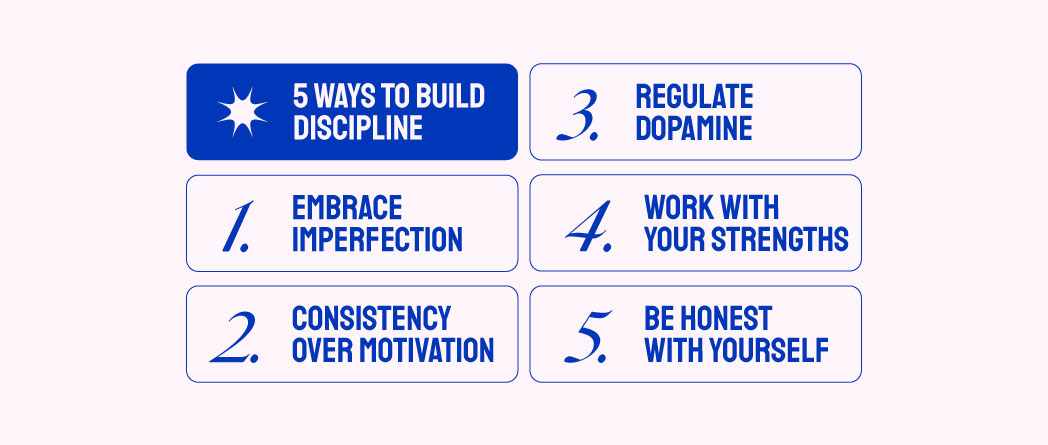In this age of instant gratification and endless distractions, building discipline can seem like a challenge. Nowadays, achieving fast results seems to matter more than the process leading up to them. However, this shift from quality to quantity is far more harmful than it seems at first glance.
Real personal growth doesn’t come from shortcuts and taking the easy way out – it develops as a result of everything we learn on our journey, and this journey requires discipline. By building discipline we not only learn to focus on long-term, sustainable success, but also begin to truly value what it means to succeed.
What is discipline and why does it matter?
At its core, discipline refers to the mastery of the self. It is the determination to reach a goal, no matter what happens, or how hard it may be to achieve. Discipline helps athletes raise their physical abilities to new heights, turns students into masters of their craft, and transforms dreamers into entrepreneurs.
Used effectively, discipline becomes the one tool in our arsenal that allows us to improve our lives by relying entirely on our own inner strength. This inner strength is what is so crucial in our day-to-day life, as it helps us navigate different challenges and unlock a world of mental and physical growth.
That’s why building discipline is so important. It’s not always easy—it takes self-belief, consistency, and a willingness to trust the process—but the journey is worth it. The good news is that with just a few simple changes in your mindset and daily routine, you can become more disciplined and, as a result, more successful and fulfilled. We’ve put together a few easy steps to help get you started.

5 ways to build discipline
1. Embrace imperfection
As soon as we accept that mistakes are human and nothing is perfect, our lives become more relaxed. Instead of focusing only on our mistakes and letting fear and shame hold us back, we need to free ourselves from the pressure of perfection and open ourselves to everything that comes with this kinder mindset.
We can’t avoid failure and loss, so it helps to learn to accept them as part of the process. Whether we’re beginners or experts, embracing mistakes helps us continue with our plans and practice resilience. Prioritizing progress over perfection helps to reduce stress and shifts our focus from the minor details to the bigger picture. This way we get a more realistic and balanced perspective on what we’re capable of achieving. Learn how to adjust your thinking patterns and lean into acceptance of imperfection - your own well-being will see itself incredibly improved if you do.
2. Consistency over motivation
The same way hard work beats talent, consistency wins out over motivation every time. At first, you're pushed by inspiration and adrenaline — but once the first rush wears off, it gets much harder to stay on track. Consistency, however, is action regardless of other influences.
Regularly committing to your goals eventually turns your actions into habits, and those habits can then transform into stable routines. Motivation has an expiration date with only the goal in mind, but routines have a durability that’s based on your starting point.

When you focus on what you’ve already achieved, instead of what’s left to do, you measure your success more realistically, not just with ambitious ideas. Keeping track of our progress in ways we can see, like personal calendars, milestone rewards, or progress jars, can help with that. It’s healthy to remind ourselves that even on the days we don’t perform as well as we’d like, by simply showing up, we’re already miles ahead of who we were at the start of our journey.
3. Regulate your dopamine balance
Focusing on long-term goals can be challenging when the modern world is buzzing with distractions. It has probably never been more difficult for humans to fully concentrate on something without interruptions than in this current age of having entertainment at our fingertips. Did you know that constantly consuming digital content can become addictive? A chemical called dopamine gives us the pleasure that comes with engaging in activities we enjoy, and our brain keeps chasing that satisfaction. This is why we keep reaching for our phones and checking our social media for likes. We grow addicted to the happy feelings, become distracted, and lose focus. This affects our ability to perform well.
However, we can break this cycle by choosing healthier ways to manage our dopamine levels. When we stop chasing quick highs and reset what makes us feel good, we can find more peace, inner calm, and that concentration we need to reach our long-term goals. Here are a few ways to help you regulate your dopamine:
24-hour detox:
Taking a break from all electronics for 24 hours is tough but worth it. By denying our brains the never-ending input of information, stimulation, and satisfaction provided by our phones, laptops, and TV’s, we break the cycle of dopamine addiction and reset the mind’s reward system.
Natural mood boosters:
Activities like exercising, listening to music, or sitting in the sunshine boost our dopamine levels while reducing our mental and physical stress. Slow living hobbies, like gardening, crafting, or keeping a journal, give us the same natural sense of joy and train our appreciation of the process at the same time. Even the smallest lifestyle adjustment, like having more whole foods in our diet or spending 10 minutes a day in nature, can hugely improve our mood and quality of sleep.
Mindfulness by the minute:
Being fully present in the moment and sitting with our thoughts, instead of distracting ourselves from them, helps us manage our feelings and needs better. Just a few minutes of focusing on our senses and regulating our breathing when our thoughts wander can help train focus and improve mental clarity. Discover just how mindful you are in day-to-day life and what you can do to enhance your conscious awareness.
Feel your body:
Too often we get caught up in the stress of life and ignore our physical needs. Do a quick check-in with yourself right now: Unclench your jaw, drop your shoulders, stretch your neck. Do you need to sit upright? Would your fingers benefit from flexing them for a while? How does stretching your legs for a few minutes sound? Whether you need active movement or just a glass of water, tuning into your body and its needs is both helpful and necessary.
Start your journey of breaking free from negative cycles with our Breaking Your Patterns Worksheet, offering a step-by-step guide to support you in your process of self-reflection and letting go.
4. Work with your strengths—not against them
Always remember that something that works for someone else might not necessarily work for you, so don’t feel like you have to follow their path or match their progress. Changing your approach to fit your lifestyle or personal preferences can help you avoid frustration and stay on track. Ask yourself these questions to figure out what works best for you.
1. What are my deepest needs and desires?
2. Under what circumstances do I deliver the best results?
3. Do I benefit more from teamwork or isolation?
4. What type of learner am I? (Visual, auditory, etc.)
5. Are my goals and timelines realistic for my current lifestyle?
Using your personal strengths to reach your goal increases your likelihood of sticking with your plan, as well as your enjoyment of the process itself. The deeper we dive into the very essence of who we are, like discovering the dimensions of our personality, the easier it becomes to see what we need to grow into the person we want to be.
5. Be honest with yourself
Finally, let’s discuss one of the most basic but often overlooked aspects of building discipline: honesty. Being honest with ourselves about what we do, how we feel, and where we struggle, is an important part of documenting our journey. Truthfully tracking our progress helps us recognize different patterns, triggers, and cycles that need to be broken so that we can build a better life. This way we can stop destructive behaviors and adjust our actions early on, making it easier to bring positive change into our lives.
Being honest with ourselves also makes us accountable for our actions, which is an important part of personal growth. It’s easy to shift the blame for our problems onto others, but at a certain point we need to assume responsibility for our actions. Instead of asking the age-old question of “Why is this happening to me?”, we can, instead, wonder: “What can I do differently to move closer to my goal?” Try out our free accountability worksheet to help work through your feelings without judgment or pressure.

Keep up the good work
If you’ve made it this far into the article – congratulations! You’ve already proven your discipline by reading up to this point—your next victory now lies in taking action. It’s important to recognize that with new and exciting journeys, every step of the way counts as progress. Over time, these little steps amount to an enormous and important change for the better. When we open ourselves up to imperfections, hack our brain chemistry, work with our strengths, remain persistent, and (above all) practice honesty, there’s no limit to what we can accomplish.

All good things take time. Acknowledge your successes, grant set-backs patience, and remember, it’s a marathon, not a sprint—your journey is just as important as your destination.
Find more self-improvement tips in our article category and explore your purpose with our Discovery Tests.



